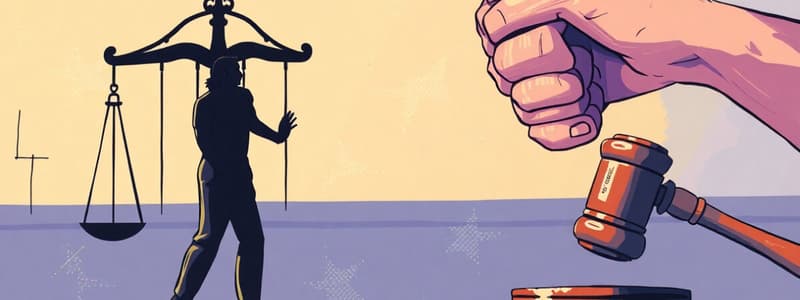Podcast
Questions and Answers
What is the purpose of a bail bond?
What is the purpose of a bail bond?
A bail bond is a document that guarantees the appearance of the accused in court. It involves a financial pledge that will be forfeited to the court if the defendant fails to appear.
What is the function of a magistrate during an initial appearance?
What is the function of a magistrate during an initial appearance?
During the initial appearance, a magistrate assesses the legality of the defendant's arrest and informs the defendant of the charges against them.
What is the primary goal of a specialized court?
What is the primary goal of a specialized court?
Specialized courts are designed to reduce recidivism and enhance public safety. They do so by marshalling resources to support the returning prisoner's reintegration into society, including applying graduated sanctions and positive reinforcement measures.
What does it mean to commit an act of 'retribution'?
What does it mean to commit an act of 'retribution'?
Signup and view all the answers
The goal of 'restorative justice' is to ensure the victim and community are adequately compensated for the harm caused by a crime.
The goal of 'restorative justice' is to ensure the victim and community are adequately compensated for the harm caused by a crime.
Signup and view all the answers
What is an advantage of implementing electronic monitoring for offenders?
What is an advantage of implementing electronic monitoring for offenders?
Signup and view all the answers
What is the main idea behind 'shock probation'?
What is the main idea behind 'shock probation'?
Signup and view all the answers
What is the term for the number of probation clients assigned to a single officer?
What is the term for the number of probation clients assigned to a single officer?
Signup and view all the answers
What is the meaning of 'incarceration'?
What is the meaning of 'incarceration'?
Signup and view all the answers
What is the term for a prison program designed to assist inmates with finding jobs or other resources upon release?
What is the term for a prison program designed to assist inmates with finding jobs or other resources upon release?
Signup and view all the answers
What is 'parens patriae'?
What is 'parens patriae'?
Signup and view all the answers
What is the term for the number of inmates a prison was designed to hold?
What is the term for the number of inmates a prison was designed to hold?
Signup and view all the answers
Define the term 'custody level' as it pertains to prison administration.
Define the term 'custody level' as it pertains to prison administration.
Signup and view all the answers
What is a 'private prison'?
What is a 'private prison'?
Signup and view all the answers
What is the 'plea bargain' process?
What is the 'plea bargain' process?
Signup and view all the answers
What is the meaning of a 'plea of 'not guilty'?'
What is the meaning of a 'plea of 'not guilty'?'
Signup and view all the answers
What are 'rules of evidence' in the context of criminal court proceedings?
What are 'rules of evidence' in the context of criminal court proceedings?
Signup and view all the answers
What is meant by the term 'criminal sanction'?
What is meant by the term 'criminal sanction'?
Signup and view all the answers
Study Notes
Criminal Justice System
-
Release of Accused: Release of an accused person from custody, potentially before or during prosecution, contingent on their promise to appear in court.
-
Initial Appearance: Defendant's appearance before a magistrate; assesses the legality of the arrest and informs the defendant of charges.
-
Bail: A document guaranteeing the defendant's court appearance. It may involve pledges of money or property; if the defendant doesn't appear, the court retains the bail. Bail can involve land, houses, stocks, or other tangible possessions.
-
Pretrial Danger to Others: Imposition of criminal sanctions to prevent pretrial release if the defendant poses a danger to the community.
-
Reducing Recidivism: Methods (like imprisonment) aimed at decreasing the likelihood of future criminal offenses.
-
Vindictive Action: Acts of revenge against a criminal perpetrator.
-
Recidivism: Relapsing into criminal behavior after sanctions or intervention for a past criminal behavior.
-
Restorative Justice: Aimed at making the victim and community whole through sentencing.
-
Specialized Courts: Reduce recidivism with positive reinforcement, support, and supervision.
-
Electronic Monitoring: Tracking offenders under house arrest or restrictions through electronic technology.
-
Home Confinement: A sentence requiring offenders to stay in their homes, possibly monitored electronically.
-
Shock Probation: Offender is sentenced to prison, given probationary release, sometimes with surprising results. It may not reduce recidivism.
-
Probation/Parole: Supervision strategies for released offenders.
-
Prisons as Correctional Institutions: Factors like behavioral patterns, inmate gangs, the orderly operation of facilities.
-
Non-Intervention Policy: Approach to prison management historically adopted in US courts.
-
Complaints in Court: Procedures involving documents for legal complaints (informations/indictments) against offenders.
-
Juvenile Courts: Handling offenses committed by individuals under the legal age.
-
Juvenile Offenses: Acts against the law determined by being a minor; acts by minors contrary to law by virtue of their age status.
-
Status Offenses: Minor offenses that are only considered offenses when committed by a juvenile, often related to legal violations.
-
Juvenile Delinquency: Legal violation of the law by a minor; a juvenile court can be the recourse for determining juvenile status offenders.
-
Custody Considerations: Decisions concerning custody, including involvement with juvenile courts and authorities.
-
Juvenile Abuse: Forms of abuse (physical, sexual, or mental) and the role of legal authorities.
-
Criminal Procedure: Legal processes concerning evidence, case procedures and court rulings.
-
Negotiated Settlement: Agreement between defendants, prosecutors, and court regarding pleas and sentencing.
-
Criminal Plea Bargaining: Defendant's formal response to accusations of guilt or innocence; guilty pleas can lead to sentencing negotiations.
-
Admissibility of Evidence: Court rules determining which evidence is acceptable in court, during hearings.
-
Judicial Sanctions: Imprisonment, probation, or other penalties administered by the court.
Studying That Suits You
Use AI to generate personalized quizzes and flashcards to suit your learning preferences.
Related Documents
Description
Explore the key elements of the criminal justice system, from the release of the accused to the implications of bail. This quiz covers initial appearances, pretrial risks, and strategies for reducing recidivism. Test your knowledge of important legal concepts and processes.




